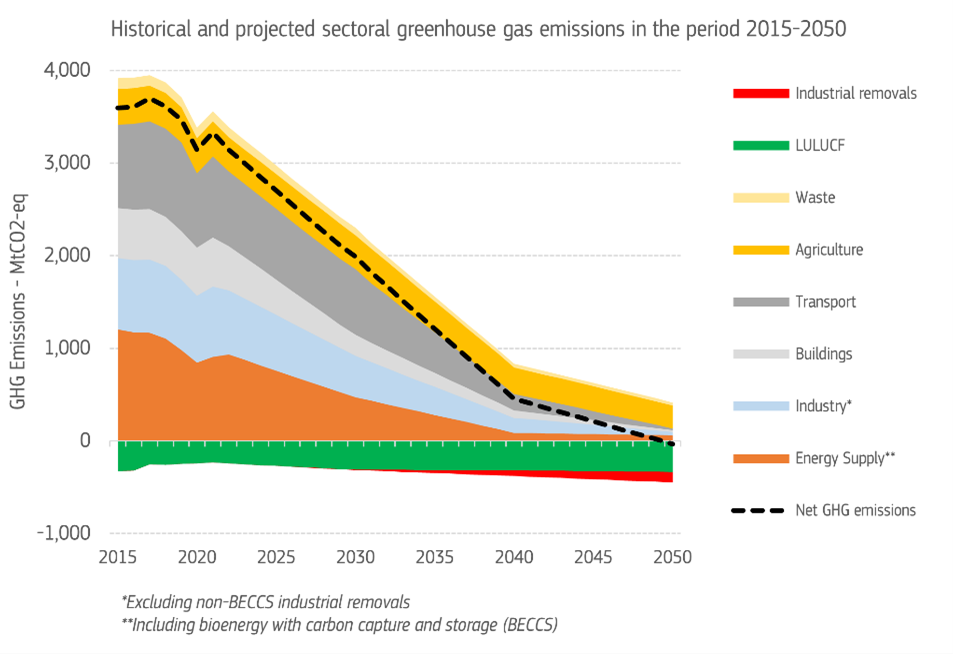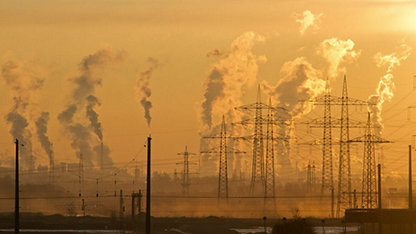The European Commission is taking decisive steps towards achieving its ambitious climate goals, aiming to become climate-neutral by 2050. To meet this objective, the Commission proposes a 90% net reduction in greenhouse gas emissions by 2040 compared to 1990 levels. This aligns with recent scientific advice and the EU's commitments under the Paris Agreement. The Commission outlines key actions required to attain this target, emphasising the importance of existing laws, industrial decarbonisation, domestic manufacturing growth, and maintaining fairness and solidarity throughout the transition.
The actions proposed for achieving the 90% reduction target by 2040 are the following:
- Implement existing EU laws aimed at reducing emissions by at least 55% by 2030.
- Decarbonise industries by leveraging existing strengths, such as wind power, hydropower, and electrolysers. New measures include managing carbon emissions through investment in technologies that capture, store, and reuse carbon.
- Increased domestic manufacturing in sectors like batteries, electric vehicles, heat pumps, and solar cells.
- Fairness, solidarity, and social policies are emphasised as core elements of the transition.
The proposed target will undergo discussion with the European Parliament and Member States. Legislative proposals will be put forward by the next Commission based on these discussions, and the European Climate Law will codify the goal of climate neutrality by 2050.
Energy efficiency and buildings
A universal commitment is emphasised, highlighting that all sectors must actively contribute to the shared goal of achieving climate neutrality and mitigating the impacts of climate change, including our sector.
To decarbonise the built environment, the communication prioritises the "Energy Efficiency First principle" until 2040. It advocates circular business models, green public procurement, and sustainability in the public sector, with the following initiatives:
- Efforts to improve energy efficiency in the EU building stock (42% of final energy consumption).
- Carbon pricing from 2027 aims for a level playing field and funds the Social Climate Fund.
- Electrification, targets a 50% share of electricity in final consumption by 2040, mostly from renewables and nuclear power.
- Investments in grid expansion, digitalization, and AI are vital.
- Fossil fuel consumption is projected to drop 80% by 2040, with policies promoting carbon capture, and low-carbon alternatives, and phasing out inefficient subsidies, addressing energy poverty.
RICS stands in full support of the European Commission's commitment to addressing climate change challenges. Undoubtedly, ambitious climate targets are indispensable to combat the pressing issues of climate change. In the pursuit of achieving net-zero emissions by 2050, RICS urges the European Commission to implement key initiatives for significant reductions in both operational and embodied emissions.
We recognise our collective responsibility to collaborate and actively contribute to reducing carbon emissions. A crucial element in this endeavour is the adoption of a consistent approach to measuring and reporting carbon throughout the entire life cycle of a project, through our Whole Life Carbon Assessment standard released in 2023.
For any questions, please contact Valeria Sepe, sustainability specialist at vsepe@rics.org














